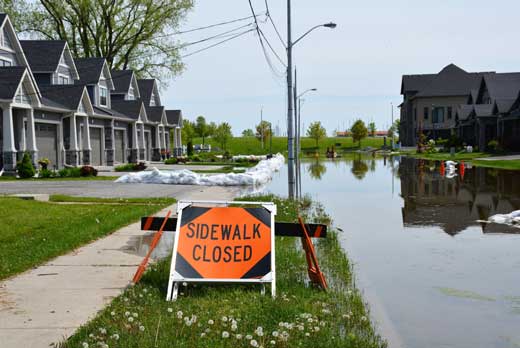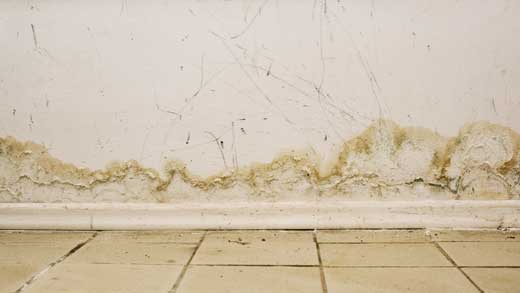
You wake up in the morning and notice a weird smell coming from your basement. Upon inspection, you realize that sewage has backed up into your home and ruined your lower level. No worries, right? Your home insurance will cover it.
Unfortunately, sewer backups are not covered under a basic home insurance policy. This type of coverage must be added in order to cover damages caused by sewage backing up into your home. While many homeowners strive to keep their insurance premiums low, sewer backup coverage is not a provision that should be quickly dismissed.
Keep reading to learn what causes sewer backups and why you should consider having sewer backup coverage added to your home insurance policy.
What Causes Sewer Backups?
Sewer backups can be caused by numerous factors such as periods of heavy rainfall, backups from your municipal sewer system, private septic system and sump pump failure. When these systems cannot handle excess water, it could overflow into your home through your plumbing and cause extensive damage – especially on lower floors or in basements.
Sewer backups can cause black mold, harmful bacteria and sewage to seep into your home, creating health risks (not to mention a pungent smell).
Sewer backups should not be confused with flooding which often covered under a completely separate policy that is also not included in a basic home insurance policy. Floods are caused by spring run-off, melting snow and overflowing water sources such as rivers, lakes and streams.
Other types of water damage are typically covered under a homeowners’ policy as long as the damage is sudden and accidental – and not caused by freezing. This could include the sudden failure of your home’s HVAC system, a blocked toilet or a burst water pipe.
Otherwise, water entering the home through leaks, cracks and seepage are considered to be the responsibility of the homeowner and can be easily prevented through regular home maintenance. Therefore, most insurance companies will not cover these damages.
What is Sewer Backup Coverage?
Sewer backup coverage can be added to your home, tenant or condo insurance policy and will pay for damages to your dwelling caused by the sewer system backing up.
Most home insurance policies do not include water damage, including sewer backup. Without the coverage, it is very difficult to get a claim paid if damage to your home is caused by water. If you live in a low-lying area along a river or ravine, and if your area has combined storm and sanitary sewers, this coverage is useful.
To figure out if you should purchase sewer backup coverage, you should take the following into consideration:
- The neighbourhood density in relation to the size of the sewer line.
- The frequency of severe weather in your area.
- The number of sewer backups reported in your neighbourhood.
- Your home’s elevation relative to sea level.
Determining whether or not these factors justify adding sewer backup coverage to your existing policy can be confusing.
Feel free to reach out to our team of insurance professionals at Arc Insurance. We can find the best insurance coverage to suit your home’s needs and help you determine if sewer backup coverage is right for you!
The Benefits of Having Sewer Backup Coverage
Sewer backup coverage is fairly inexpensive and water backups can happen to anyone.
Different limits of coverage are available to match your unique needs. An insurance agent will help you choose the best limit on sewer backup coverage based on whether or not your basement is partially or fully finished or if your basement is a storage area for expensive items.
Most importantly, sewer backup coverage qualifies you for Loss of Use coverage in the case that your home is unliveable because of related damages. For example, if your furnace is damaged by water backup during the cold winter months, your home would be virtually uninhabitable. Loss of Use coverage would cover additional living expenses such as hotel costs and loss of rent.
Without this coverage, the cost of repairing damage caused by sewer backup can add up to tens of thousands of dollars. The cost of adding this coverage to your existing policy is minimal compared to what you could potentially pay out of pocket should your home experience a sewer backup.
How to Prevent Sewer Backups
Of course, being proactive is the best way to avoid sewer backups altogether. There are steps you can take to protect your home from unwanted sewage seeping into your basement and causing damage:
- Be careful what goes down your drains and toilet: Pouring cooking oil or grease into your drains can create a clog in the main sewer line. Likewise, paper towels, diapers and feminine products should never be flushed down the toilet.
- Maintain your sewer lateral: It’s actually the homeowner’s responsibility to maintain the pipeline between your house and the city’s sewer main. Cracks, deterioration and even tree roots can damage laterals and cause a sewer backup.
- Consider replacing lines with plastic piping: Plastic pipes are more resilient to tree roots and other forms of damage.
- Inspect your property for illegal plumbing connections: Looking into your city’s building codes to see what you are allowed to connect to the sewer. Depending on your area, connecting French drains, sump pumps and other flood control systems may be illegal and can cause debris to clog the line.
- Install a backwater prevention valve: A backwater valve is a piece you can install onto the sewer line in your basement that allows sewage to go out but prevents it from coming back in.
Live With Peace of Mind
Proper coverage for your home is key to living safely in your home with peace of mind. Talk to one of our knowledgeable insurance professionals at ARC Insurance to explore your insurance needs and determine if sewer backup coverage is right for you. This inexpensive policy can make a huge financial difference when it comes to dealing with a sewer backup in your home.


